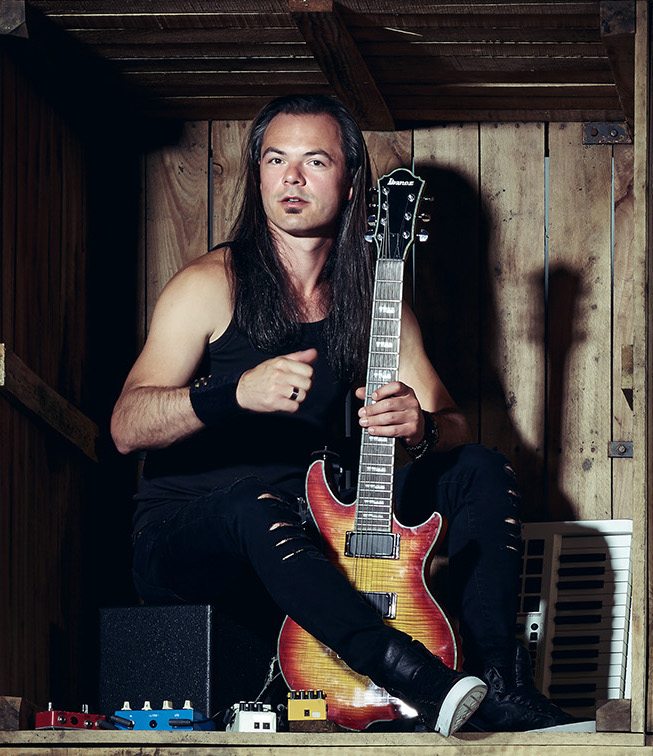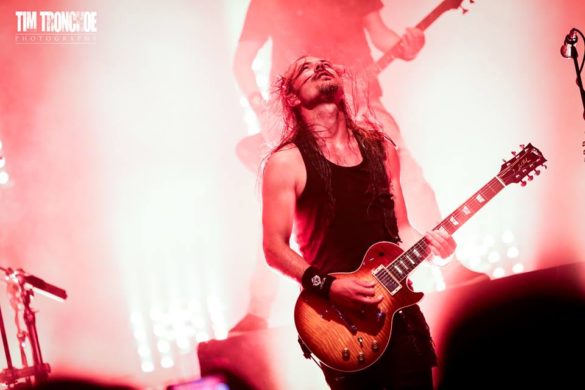
European symphonic metal heavyweights Epica are preparing for their return to the United States for a stacked tour with Lacuna Coil, Insomnium and Elantris, a monthlong trek that will see them hit a large part of the United States and Canada. Before they hit the road, Decibel caught up with guitarist Isaac Delahaye to discuss touring stateside versus in Europe and Delahaye’s background as a guitarist for extreme metal bands like God Dethroned.

You’re heading out on tour in the US in September with Lacuna Coil, Insomnium and Elantris. You’re coming from the Netherlands- what goes into making a tour like this happen?
It’s obviously not the first time we’re doing a US tour, so we work with an American booker. The first tour we did for the new album (The Holographic Principle, released September 2016) was actually a US tour, and that went really great so we didn’t want to wait too long because we had some bad experiences in the past with cancelling tours and all that in the US in particular. We just didn’t want to wait as long as we did in the past to come back and I think especially with this package —Insomnium, Lacuna Coil— they’re also European bands, so I think it’s nice to bring a whole package like that over to the U.S. and added with Elantris of course. It’s exciting because presales are going really well.
In Europe, we call it the “US way,” which is you put together bands which are typically not in the same genre so to speak. And that’s something in Europe that is now coming over from the US. You put different acts together, like Epica is symphonic metal and another band is maybe death metal and you have power metal or whatnot. You just combine different genres.
How do you notice that things are different touring in the United States versus touring in Europe and other regions of the world?
Well, first and foremost, it’s huge. It’s bigger. So to get from A to B—let’s say A is a big city and B is a big city—just to get from A to B is a long distance and sometimes you have the smaller stages in between. There’s no way around it. We only do the east and the west coast and then Canada, going from Los Angeles all the way to Florida or something. We don’t even do the midland so to speak; there’s not enough time for that and it’s a huge country, so that’s already different. Always, the longest tours are the US tours.
In the last couple of years, we did these meet and greets where people can have their stuff signed by us and we take a picture with them and they get some special exclusive stuff, and it was actually a former booking agent who came up with that, like “you should do that because people in the US, they really like that.” It showed. Every time, these tickets go so fast and people, when you actually meet them, they’re so happy to be there and they travel for hours and hours to get to the show, which is also rare in Europe.
I’m the only guy from Belgium, actually, not from Holland, so if I want to travel to a show in the biggest place in Belgium, it’s mostly two hours max is what I would drive. And so we’re really spoiled because within those two hours, I can also go to other places and see other bands. And it’s the same in every country, basically. Distances are a lot smaller if you do all the capitals in Europe, you just have a pretty much back-to-back tour and in the US it’s a different animal, so to speak.
You have a background in extreme metal. You were in God Dethroned, among some other bands. Do you notice the influence from that background when you’re playing with Epica or writing with Epica?
Oh yeah, definitely. The funny thing is, I started back in the days when I was 15-16, my first bands were a lot of thrash metal, but also melodic death metal like Gothenburg-style. That stuff was getting bigger those days, so I listened to a lot of those bands, and the obvious bands like Pantera, Machine Head. When I was a kid those bands were really big, and Rage Against the Machine, so those were the influences.
Then, starting with bands, I pretty much always went into the melodic death metal style if I had to write. Especially with God Dethroned, which had a lot of black metal influences as well. But then, when I started playing for Epica, the day I started, I started pre-producing guitars for Design Your Universe, the album which came out in 2009. That was my first assignment, so to speak, so it was like “Go ahead and do whatever you like.”
I was like “OK, I’ll do my best and see where I can get.” What I thought would be “go ahead and we’ll see what fits, then we’ll change some stuff back to basic or normal,” it didn’t really happen. Pretty much everything I came up with was like “This is cool, it’s refreshing. It’s something we haven’t done before.”
Also, looking back at the albums we have made ever since, it seems like it always gets a little heavier and sometimes it’s really hard to hear because if you have a double bass pattern with some death metal riffing and you put Simone [Simons, vocalist] on top or you put a choir on top, what would have been really brutal back then playing with God Dethroned—the exact same riff or rhythm—can get a totally different feel if you put female vocals on top of it or a choir or a string section. It’s interesting, because as a guitar player I can do pretty much anything I like. There’s black metal influences, thrash metal, melodic death metal, also classical or sometimes acoustic guitar. Back in the God Dethroned days, it had to be tough shit, so to speak, whereas now, my horizon broadened so to speak because I can do whatever I like on the guitar and if you add all these Epica elements, eventua
lly it will sound like Epica and that’s a curious thing.
I wouldn’t really say I had to change my playing or style or anything like that. A lot of people, if they ask me how to play this or that, they think Epica would be pretty easy but there’s some very technical stuff going on.
Funny fact is that for last album, we had Jacob Hansen mixing the album again and for the basic mix, he started with drum, bass and guitar and he made a basic mix of that… it was really awesome to hear that because that was the basic metal band, so to speak without all the orchestration and the choirs and all of that. You could really hear that without all that, it’s basically just a really heavy metal band and there’s death, black, thrash, whatever. There’s a lot of influences. Power metal. You name it and it’s there.
For more information on Epica’s upcoming tour, head to their Facebook page.






